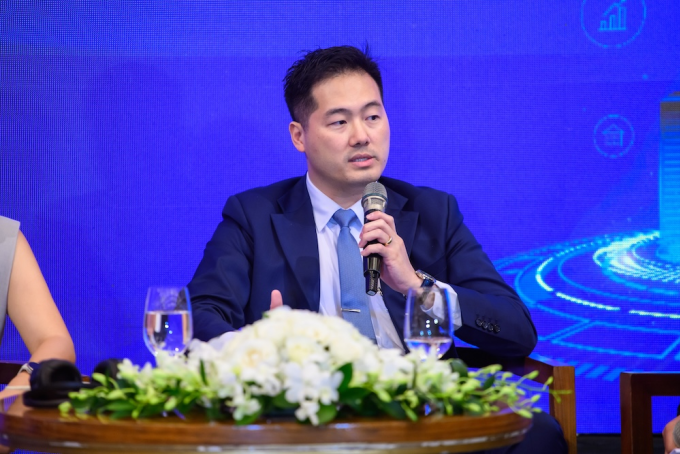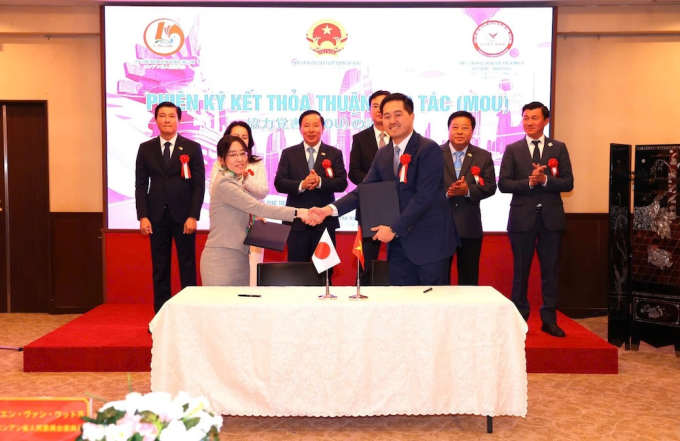Edition: International | Vietnamese
© Copyright 1997 VnExpress.net. All rights reserved.
A magnet for next-generation investment
With global tax policies shifting, trade tensions rising, and supply chains being restructured, businesses are rethinking their investment strategies. At the same time, net-zero commitments are gaining momentum among many countries, including Vietnam. New trade mechanisms such as the EU's Carbon Border Adjustment Mechanism (CBAM) and global ESG standards are raising the bar for transparency in emissions, clean energy use, and green infrastructure development.
Industry experts say this is an opportune moment for Vietnam to pursue breakthrough development models like eco-industrial parks (EIPs) to attract high-quality foreign direct investment (FDI). According to Truong Khac Nguyen Minh, Deputy General Director of Prodezi Long An, investors today are focused on more than just cost or location - they are prioritizing emission targets, access to clean raw materials, and ESG compliance. These expectations are shaping a new, sustainable manufacturing ecosystem at Prodezi.
 |
|
Truong Khac Nguyen Minh, Deputy General Director of Prodezi Long An Corporation. Photo courtesy of Prodezi Long An |
"We've built our EIP model around clean energy usage to reduce CO2 emissions, including recycling at least 25% of wastewater and achieving international green building certifications. Our aim is to protect ecosystems while balancing industrial zones with livable communities," Minh said.
The project is also enhancing tenant experience with digital infrastructure, integrated logistics, one-stop administrative services, and seamless access to the adjacent LA Home eco-urban development.
He emphasized that these value-added features are central to Prodezi's competitive advantage in attracting high-quality FDI from countries like Japan, South Korea, the EU, and throughout ASEAN, helping to diversify investment sources. Prodezi is particularly targeting green and high-tech sectors, including electronics, automotive, supporting industries, logistics, data centers, semiconductors, and AI.
Synergistic development through industrial symbiosis
Prodezi also promotes industrial symbiosis, encouraging companies to share or repurpose materials and waste to reduce costs and increase efficiency. While this remains a challenge for traditional industrial zones, Prodezi was designed from the ground up to support resource-sharing. It features recycled water systems, waste-sorting infrastructure, and solar energy initiatives in collaboration with Japanese partners.
 |
|
Prodezi IP is located next to LA Home eco-urban area. Photo courtesy of Prodezi Long An |
"International partnerships with companies like Toho Gas, Chitose, and TA Vital are enabling our first industrial symbiotic networks, spanning energy, wastewater, and organic fertilizer," Minh said.
As occupancy increases, Prodezi plans to scale these symbiotic practices across clustered sectors, such as food packaging and by-product recycling. These efforts not only reduce costs but also maximize resource use, driving circular economy models within the park.
"Our infrastructure and comprehensive support are designed to help tenants fully leverage their competitive potential," Minh added. He envisions Prodezi, along with LA Home, evolving into a modern and sustainable ecosystem that integrates industry, urban life, and community services in the Mekong Delta, driving long-term economic and social growth.
Prodezi's eco-industrial park goes beyond environmental compliance - it aims to generate enduring economic and societal benefits. Countries like Denmark and South Korea have shown that improving resource efficiency and reducing pollution can deliver strong returns and long-lasting value.
 |
|
The signing ceremony between Prodezi Long An and Chitose Group in Japan, March 30. Photo courtesy of Prodezi Long An |
Vietnam is also creating a legal foundation for EIPs through Decree 35/2022/NĐ-CP and more recently, Resolution 68-NQ/TW, which together provide a more favorable regulatory environment for eco-industrial development.
However, challenges remain. As of May 2024, only 1–2% of Vietnam's 425 industrial parks have transitioned to EIPs, according to the Ministry of Industry and Trade. This underscores the urgent need for stronger legal and policy support to accelerate the transformation.
To ensure long-term sustainability, Minh advocates for a dedicated Industrial Park Law to create a comprehensive legal corridor that enables Vietnam's industrial sector to thrive.
Vietnam stands at a crucial juncture. Embracing future-ready models like eco-industrial parks will be vital for enhancing the country's appeal to investors. The EIP concept is no longer niche, it is essential for building a competitive, sustainable, and globally integrated industrial economy. With strategic foresight and bold execution, Prodezi and its peers are helping shape the future of industrial development in Vietnam.
Spanning 400 hectares at the junction of Provincial Road 830 and Luong Hoa–Binh Chanh Boulevard in Ben Luc District, Long An, Prodezi IP offers sustainable industrial land, ready-built warehouses, and modern factory solutions. Its location provides strategic access to key highways including the HCMC–Trung Luong Expressway, Ben Luc–Long Thanh Expressway, and Ring Roads 3 and 4. Infrastructure upgrades planned for 2025–2026 are expected to reduce travel time to central Ho Chi Minh City, Long Thanh Airport, and major seaports like Cat Lai and Cai Mep.
Situated at the gateway between Ho Chi Minh City and the Mekong Delta, Prodezi Industrial Park is well-positioned as a high-potential investment destination, especially as nearby provinces like Tay Ninh enhance their trade connectivity.